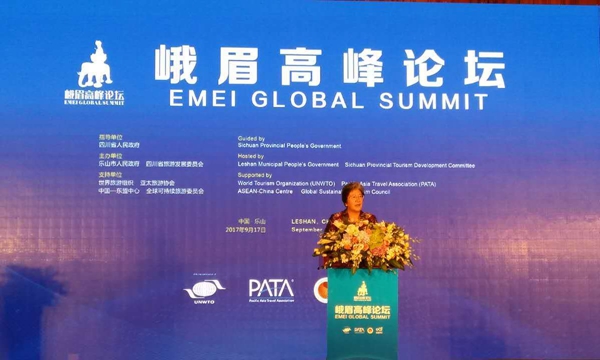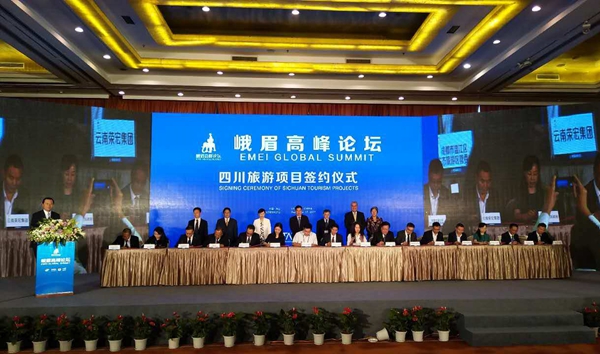
On 17 September 2017, Emei Global Summit of the 4th Sichuan International Travel Expo (SCITE) was held in Leshan. The summit was co-hosted by Leshan Municipal People’s Government and Sichuan Provincial Tourism Development Committee, supported by United States World Tourism Organization (UNWTO), Pacific Asia Travel Association (PATA), ASEAN-China Centre (ACC) and Global Sustainable Tourism Council (GSTC), and moderated by Mr. Zhang Tong, Deputy Secretary of Leshan Municipal Party Committee and Mayor of Leshan Municipal People’s Government. More than 200 guests, including Mr. Fu Yonglin, Director-General of Sichuan Provincial Tourism Development Committee, Mr. Zhu Shanzhong, Executive Director of UNWTO, Mr. Dale Lawrence, Special Adviser to CEO of PATA, H.E. Mme Yang Xiuping, Secretary-General of ASEAN-China Centre (ACC), Mr. Randy Durband, CEO of GSTC, and delegates from global tourism industries and media attended the summit.
Secretary-General Yang Xiuping said that SCITE and Emei Global Summit have become an important summit for boosting tourism exchanges and cooperation between China and the rest of the world including ASEAN countries. This year’s Emei Global Summit, with the theme “Sustainability, Creativity and Responsibility”, would further strengthen regional tourism cooperation and play a positive role in enhancing the understanding of the sustainable development of tourism, promoting creative tourism products and providing higher quality services. She briefed on the positive results of ASEAN- China tourism cooperation, and said that the year 2017 is very important as it marks the 50th anniversary of ASEAN and the ASEAN-China Year of Tourism Cooperation. With the building of the Belt and Road, infrastructure and institutional connectivity would be further strengthened, which would help further promote the tourism cooperation between both sides. In order to achieve sustainable development of tourism, various parties should be more creative to meet the diversified and personalized demands of the people, as well as explore new tourism products. Meanwhile, all parties should be more responsible for the conservation of cultural and natural heritage as well as other tourism resources.
Mr. Dale said that this year was designated by the United Nations as the International Year of Sustainable Tourism for Development. Promoting and encouraging sustainable and responsible tourism development is the core mission of PATA. To innovate the mode of tourism development, it is important to formulate and carry out effective and practical policies, creatively implement relevant policies, earnestly take responsibility, establish effective and meaningful cooperative relations, and make tourism play a bigger role in reducing poverty. PATA is committed to promoting the development of tourism in Asia Pacific region, and has achieved fruitful results through exchanges and cooperation with Sichuan and Leshan. According to the prediction of UNWTO, China would become the world’s largest tourism destination in 2020. In order to achieve sustainable tourism development, it is necessary for China to make long-term plans.
During the summit, “Leshan Mountain and Mountain Area Tourism Strategic Action Plan 2017-2021” was released, and Leshan city was also presented the “Acknowledgement of Sustainable Destination to Leshan Giant Buddha Scenic Area” by GSTC. At the same time, the Signing Ceremony of Sichuan Tourism Projects was held. According to Mr. Fu Yonglin, the 4th SCITE signed 28 tourism cooperation agreements of projects, with a total amount of RMB 68.5 billion.
Encompassing issues such as “Sustainability-2017 International Year for Tourism”, “Creativity on Sustainability”, and “The influence of Responsibility on Sustainable Tourism Development”, the guests discussed deeply on the significance of sustainable development of tourism and opportunities and challenges faced, and actively raised suggestions. They all believed that all countries should join hands with each other to make innovations and strive to achieve balanced development of tourism development and conservation of nature, tradition and cultural heritage, and to benefit the people of all countries.
